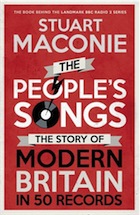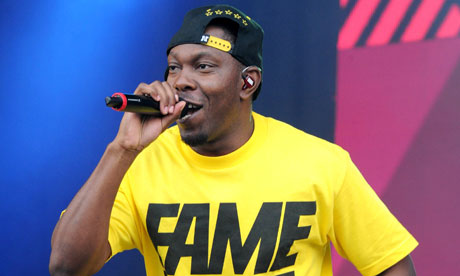No Rolling Stones but Chumbawamba … Stuart Maconie's tour of pop is an elegant and unexpected take on music as social history
One the rise … Dizzee Rascal at the Radio 1 Big Weekend. Photograph: Brian Rasic / Rex Features
 The Oxford English Dictionary traces the term "pop music" to 1926, and reduces its meaning to a matter of "popular appeal", which is fine, as far as it goes. But it omits an essential aspect of an art-form born of mass production, and open to anybody who can afford a rudimentary instrument and fancies a go: an accessibility that still runs through its ever-more varied strands, and surely makes it the most democratic cultural creation western civilisation has ever seen. To return to the OED, pop is popular not only in the sense of being "suited to the taste or means of the general public", but as something "of or carried on by the people as a whole". This is what unites George Formby and Tinie Tempah, the Beatles and One Direction: the fact that even if success is reserved for a fortunate few, just about everyone begins in the same place – light years from any conservatoire, plunking at an instrument, chattering into a microphone or posing in front of a bedroom mirror.
The Oxford English Dictionary traces the term "pop music" to 1926, and reduces its meaning to a matter of "popular appeal", which is fine, as far as it goes. But it omits an essential aspect of an art-form born of mass production, and open to anybody who can afford a rudimentary instrument and fancies a go: an accessibility that still runs through its ever-more varied strands, and surely makes it the most democratic cultural creation western civilisation has ever seen. To return to the OED, pop is popular not only in the sense of being "suited to the taste or means of the general public", but as something "of or carried on by the people as a whole". This is what unites George Formby and Tinie Tempah, the Beatles and One Direction: the fact that even if success is reserved for a fortunate few, just about everyone begins in the same place – light years from any conservatoire, plunking at an instrument, chattering into a microphone or posing in front of a bedroom mirror.Maconie makes another point: that great pop "both nods to history and makes history". It can also point to the future, thanks to how quickly its practitioners can move – one laptop, a smidgeon of talent, and off you go – and the fact that it often emerges from subcultures on the cutting-edge of where society is headed. In the UK, it was via pop that millions of people got their first taste of a multiracial society, the normalisation of homosexuality, political dissent, all manner of drug cultures, and more. What other form could have placed a buck-toothed gay man – who also happened to be the child of Indian Parsis – in front of three white longhairs, and allowed them to trade as Queen? Where else could the racism of the late 1970s have been challenged by a salt-and-pepper collective named Two Tone? Is there another form of expression that could have celebrated England's efforts in the 1990 World Cup via a creation titled "World in Motion", whose authors – the Mancunian quartet New Order – tried to reference the huge contemporaneous popularity of ecstasy in the working title "E For England"? (The FA vetoed that title.)
The People's Songs is essentially music as social history: 49 essays about 49 records (the 50th will be chosen by the public), from Vera Lynn's "We'll Meet Again" to Dizzee Rascal's "Bonkers". In seemingly random order and with additional documentary material, its chapters are already being broadcast each week on Radio 2. But its printed manifestation is arranged chronologically – with frequent digressions – from the second world war to the era of Leona Lewis, Amy Winehouse and Elbow. Its essential tale is of a great unfolding of self-expression and what the liberal left calls diversity, with regular outbreaks of grimness and trouble.
More

No comments:
Post a Comment